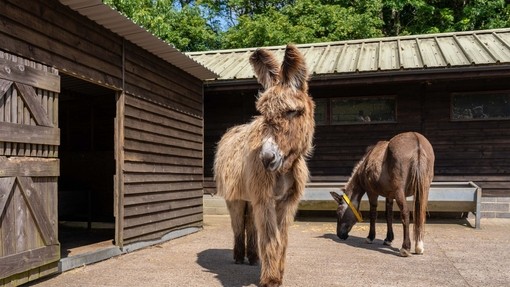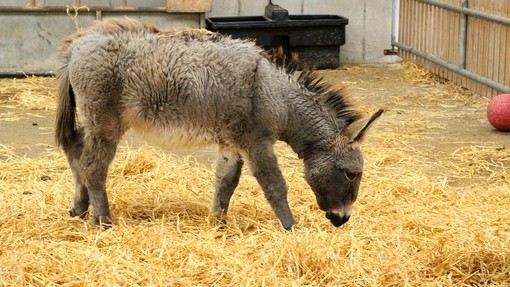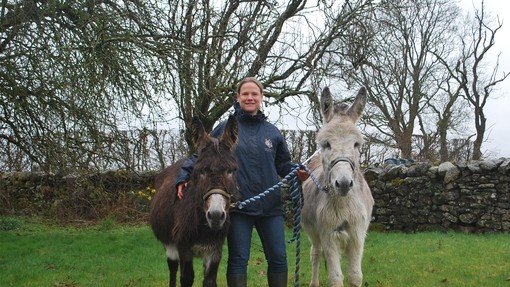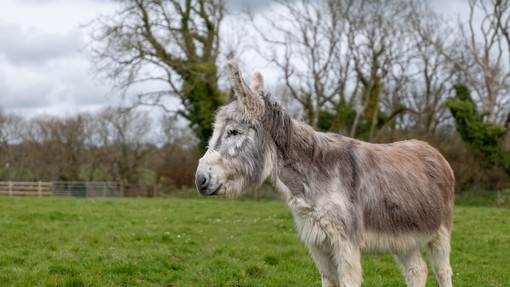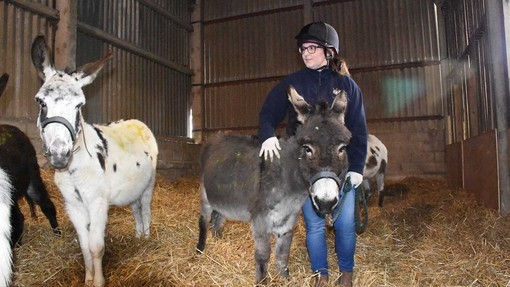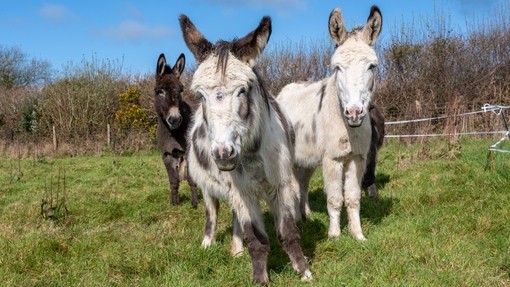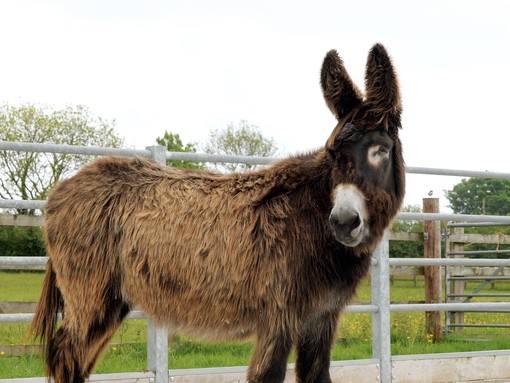
Peter Wright meets Champagne the Poitou donkey
Peter Wright, our ambassador and star of TV’s The Yorkshire Vet, recently met up with Jamie Forrest, Veterinary Surgeon at The Donkey Sanctuary, to hear all about Champagne’s surgery and how well she’s coping following her operation.
Jamie explained that when Champagne first came into our care, she had a few health issues, including a history of hoof problems and severe glaucoma, which had resulted in blindness in one eye.
Because Champagne’s left eye was causing her a great deal of pain and as she couldn’t see through it, our Veterinary team decided to remove it.
Champagne’s surgery
Jamie explained how the team performed local nerve blocks to the non-functional eye so Champagne didn’t feel a thing during the surgery, which took place at our specialist donkey hospital in Devon.
Jamie said: “After the operation, Champagne was put on a course of pain relief, with a pressure bandage over her face to stop any risks of bleeding from the surgery site.
“Because she was already completely blind in the eye we removed, she coped fine. The surgery site healed beautifully, and Champagne was moved off medication completely within just a few weeks.”
Peter applauded the team’s decision to operate saying: “I don’t think we are necessarily aware of how much pain the donkeys suffer with glaucoma, day in and day out – and that the pain is permanent.”
The Poitou breed
Peter is familiar with Poitou donkeys but was keen to find out more from our experts about some of the reasons behind their health issues.
Jamie explained: “Poitou donkeys are a giant breed originating from France, known not only for their huge size but also their long, shaggy coats and gentle natures. But sadly, the breed can suffer from a number of health problems.
“Donkeys’ feet in general are a lot softer than horses’ feet and absorb a lot more moisture. But because Poitou donkeys’ feet are so large and they weigh so much more than an African wild ass does, they are prone to more complex foot problems.”
Peter said: “Sadly I know the larger breed donkeys have a much shorter life expectancy than smaller, standard donkeys.”
Successful solutions
Donkeys rely heavily on their senses in the wild – hearing, smell, vision – but can cope well in a domestic environment with just the one eye.
As a fellow vet, Peter explained that he has performed eye removal surgery on many animals but never a donkey. He was glad to hear that the surgery is very successful at The Donkey Sanctuary but thankfully relatively rare.
Jamie said: “Giving our donkeys a pain-free existence and their best life is at the heart of everything we do at The Donkey Sanctuary.”

The future for Champagne
Peter said: “It is fantastic to see Champagne coping so well with just one eye and how sensitive members of the team are to her needs – knowing they must just approach very carefully from her visual side so as not to cause alarm or discomfort.”
Some donkeys cope fine being completely blind; this tends to be the case if they lose their vision gradually, due to cataracts for example, and are kept in a consistent environment. Sometimes a donkey companion can even become their guide.
For now, Champagne is very comfortable spending her days at The Donkey Sanctuary with another Poitou: adoption donkey Percy.
She will be closely monitored by our grooms and veterinary teams to ensure she is kept comfortably for the rest of her life at The Donkey Sanctuary, her new forever home.
Help more donkeys like Champagne receive the veterinary treatment they need
Make a donationShare this page
Tags
- News

